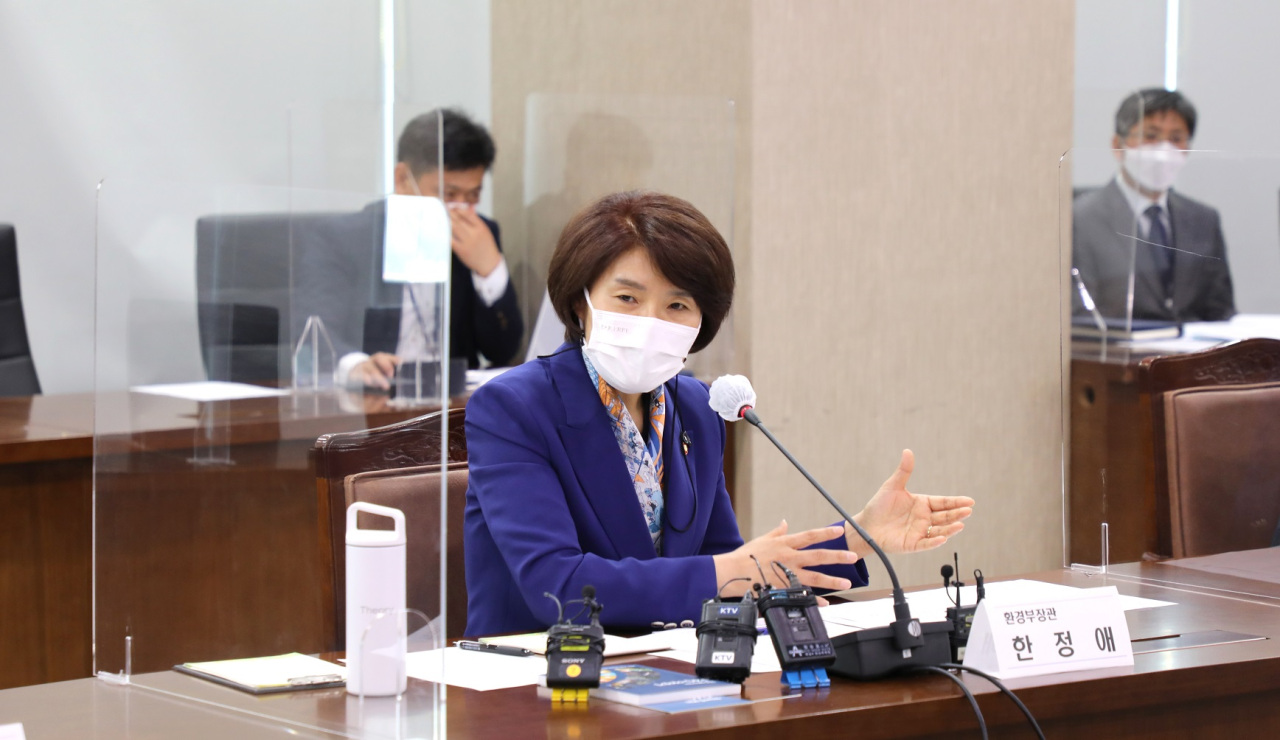
Environment Minister Han Jeoung-ae speaks during a press briefing Wednesday held in Sejong. (Ministry of Environment)
The Ministry of Environment will prioritize the needs of the industrial sector and provide necessary support for businesses as South Korea looks to move forward with its carbon neutrality plan, the ministry said Wednesday.
Environment Minister Han Jeoung-ae said in a press briefing Wednesday that the ministry understands the financial burden companies will face as the government fulfills its goal to have Korea become carbon-neutral by 2050 with increased emphasis on renewable energy sources and greater use of eco-friendly vehicles.
“As corporations mentioned in meetings with us, the transition requires astronomical costs to be realized, and we are fixed on making this happen,” Han said.
“Companies ask the government to support them in carrying out this task, and I believe the pace of transition from the industrial front is very important to pick up the pace in achieving the carbon neutrality goal for 2050.”
Han said it would be unfair to ask greenhouse gas-emitting companies to comply with state-run initiatives out of their own pockets. The minister said her office recognizes these companies are in need of state support in terms of research, development and financing.
At the moment four bills have been submitted for review at the National Assembly in regards to the carbon neutrality initiative, and the minister said she is confident that support for the business sector will be discussed while the bills are processed.
Han promised that the ministry would offer support for companies directly affected by the carbon neutrality plan, to allow them to maintain employment and achieve business gains.
“We also recognize that some sort of funds to be prepared in carrying out this plan, and I can tell you right now that we are engaged in discussions with the Finance Ministry to get that done,” she added.
The minister emphasized that the government stands firm on its nuclear phaseout policy, saying the country cannot backtrack from its goal to not extend the life cycles of the plants that are still in operation.
The government aims to lower the number of nuclear reactors from the current 24 to 17 by 2034. Nuclear energy accounted for around a quarter of Korea’s power generation in 2019.
“Even if we stick with our plan on nuclear reactors, Korea will still be 15 percent reliant on nuclear power by 2050, and that’s definitely not small,” the minister said.
“We don’t recognize the problem with this right now, but there are problems as to what we would do with all the nuclear waste coming out of these reactors and what we will do with the plants after they are closed. This is the problem of sustainability we should be addressing.”
Han believes the ministry should focus on verifying Korea’s capacity to produce power with renewable energy sources before considering whether to continue relying on nuclear energy. A transition toward renewable energy sources should not be labeled a failure before a full analysis is carried out, she said.
And in approaching the government’s goal to transition all vehicles in Korea from fossil fuel vehicles to eco-friendly ones by 2050, the minister said she will work with automakers to increase the supply of eco-friendly vehicle options to the market rather than eliminating fossil fuel vehicles in use.
“Manufacturers have their own sets of problems, as far as I know,” she said. “What the Ministry of Environment can do is focus on emission-free vehicles as to how many can be supplied to the market -- a positive direction toward speeding up the transition.”
To meet the goals for 2050, Han promised, the ministry will provide careful environmental analyses and reviews for big construction projects including a controversial multibillion-dollar plan to build a new airport in Busan.
The construction plan became the topic of heated debate when it was revealed that the Ministry of Land, Infrastructure and Transport had submitted an assessment report questioning the safety, operability, environmental impact and economic feasibility of the new airport.
Han said the new airport, if the emission concerns were addressed before its construction, “would not go against the trend of climate change,” adding renewable energy sources could be used to run the airport to minimize greenhouse gas emissions.
By Ko Jun-tae (
ko.juntae@heraldcorp.com)



![[KH Explains] No more 'Michael' at Kakao Games](http://res.heraldm.com/phpwas/restmb_idxmake.php?idx=645&simg=/content/image/2024/04/28/20240428050183_0.jpg&u=20240428180321)


